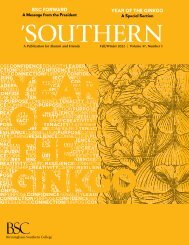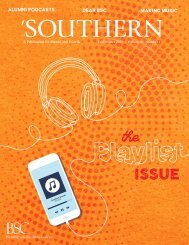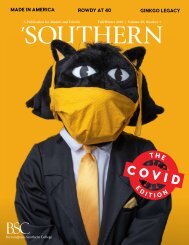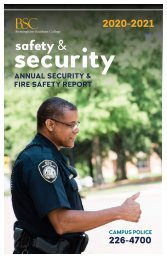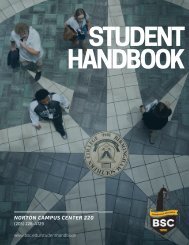'Southern Winter 2019
You also want an ePaper? Increase the reach of your titles
YUMPU automatically turns print PDFs into web optimized ePapers that Google loves.
Service<br />
DOGS 101<br />
After an E-term class on the sociology of therapy and service<br />
animals, a group of Birmingham-Southern students were inspired to<br />
educate others on the different types of support animals, and now<br />
their work is being seen nationwide.<br />
The BSC students wrote, directed, and starred in a video, published<br />
and filmed by the National Center on Health, Physical Activity and<br />
Disability (NCHPAD). The final video, which explains the difference<br />
between service dogs and emotional support animals (ESAs), was<br />
released this September in honor of National Service Dog Month.<br />
After extensive training, a service dog completes tasks that assist<br />
and protect the handler, an individual with disabilities. This bond<br />
forms the long-term “team” of a handler and his or her service dog, a<br />
connection that can often be misunderstood and legally complex.<br />
Dr. Meghan Mills, assistant professor of sociology, developed<br />
her E-term class around the misunderstandings of support animals<br />
and the legal intricacies behind each type of animal. Her research<br />
focuses on these issues, and Mills herself is accompanied by her<br />
own service dog, Arrow.<br />
“I think it’s an important social issue as more people use service<br />
dogs and as more laws change,” she says. “I’d definitely say that the<br />
prevalence of service dogs is increasing. There’s more interest in how<br />
they can help different disabilities.”<br />
When Mills first came to BSC, she pitched the idea for the class.<br />
She partners with Hand in Paw, a nonprofit organization that trains<br />
therapy dogs, allowing students to work with dogs in the class.<br />
Students take part in training exercises, observe therapy animal visits<br />
at Children’s of Alabama and The Exceptional Foundation, and hear<br />
more about Mills’ own research on the sociology of service dogs and<br />
disability law.<br />
For junior religion and sociology major Olivia Seckinger, learning<br />
the difference between the types of support animals was extremely<br />
impactful. The animals that college students have for emotional<br />
support in their dorm rooms do not have the training that therapy<br />
dogs and service dogs must have. These differences are what she<br />
focused on as the student director of the NCHPAD video.<br />
“We wanted to create something that could benefit everyone<br />
outside of our campus, but this is also a huge issue on our campus,”<br />
Seckinger says. “Not many people know the difference between<br />
these kinds of support animals. We wanted the video to help<br />
students at BSC.<br />
Seckinger wrote the script for the video, which features two<br />
teams of handlers and service dogs: junior Austin Cooper with Fitz<br />
and Hannah Collier ’19 with Arrow. Collier worked as Mills’ TA<br />
and knew Arrow well enough to complete tasks with him. Amelia<br />
Guarino ’19 and her emotional support cat, Colby, are also featured.<br />
The video follows students and faculty who learn how to treat<br />
service dogs and presents the proper etiquette surrounding teams.<br />
Service dogs only complete tasks for their handler, and, unlike what<br />
most people believe, there is no legal registration that has to be<br />
shown for a service dog in a public place.<br />
“I was interested in the difference between service dogs and<br />
emotional support animals and how they help people, especially<br />
since some people lie and use it as an excuse to have a pet on<br />
campus,” Seckinger says.<br />
Dr. Meghan Mills<br />
and Arrow<br />
In her course and her research, Mills explores how the increase in<br />
handlers with support animals comes with an increase of people who<br />
lie about their needs. The false representation, in turn, leads to a greater<br />
amount of questioning towards service dog handlers and discrimination<br />
of those who truly need them.<br />
“I’m interested in visible versus invisible disabilities as a sociologist.<br />
Some people get more questions of legitimacy,” Mills says. “Falsely<br />
presenting pets as service animals because of convenience can be<br />
detrimental to real teams.”<br />
Seckinger says that she’s seen a noticeable increase in the amount of<br />
support animals on campus, especially ESAs who stay in residence halls.<br />
Depending on the disability, service dogs and ESAs can be helpful for an<br />
individual’s wellness, and more professionals are recognizing that.<br />
“When barriers exist in the campus environment that present<br />
challenges for students accessing academics, programming, activities,<br />
events, and living in the residence halls, then utilizing service animals<br />
and assistance animals may be valuable for students,” says Angie Smith,<br />
coordinator of academic<br />
accessibility services.<br />
Outside of the classroom,<br />
Mills continues to bring<br />
awareness to these social<br />
Watch “Service Dogs 101”<br />
at nchpad.org/videos<br />
issues due to this growing frequency of support animals. She leads<br />
professional development and legal education sessions through<br />
Children’s of Alabama and St. Vincent’s Birmingham, since medical<br />
professionals need to be aware of the facts but can sometimes be the<br />
least aware. Mills leads Arrow in a demonstration and speaks about her<br />
personal story, all as volunteer work to educate the community.<br />
“It’s harder because they’re dogs, but service dogs are medical<br />
equipment. You wouldn’t pet or greet a wheelchair,” she says. “You have<br />
to see the person before the animal.”<br />
To learn more about having a support animal on BSC’s campus, reach out<br />
to Angie Smith at awsmith@bsc.edu or accessibility@bsc.edu.<br />
FALL/WINTER <strong>2019</strong> / 5


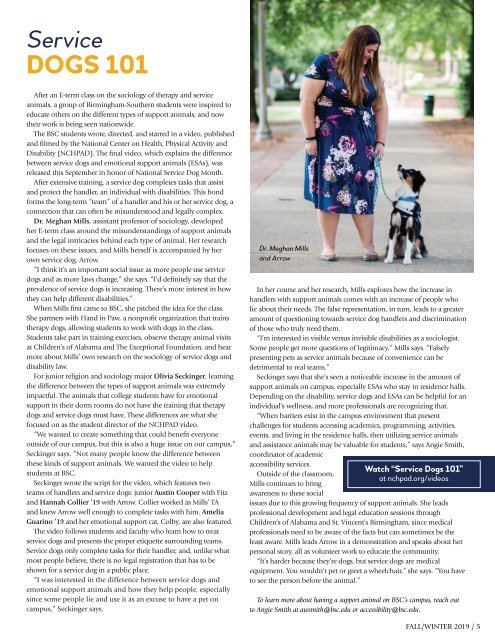
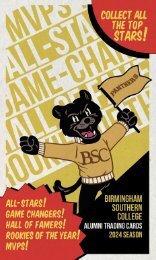
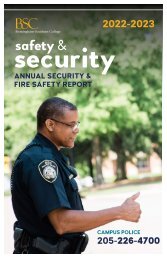
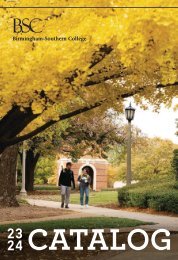
![2023-2024 BSC Catalog Updated_UG ONLY_FINAL[82]](https://img.yumpu.com/68414854/1/178x260/2023-2024-bsc-catalog-updated-ug-only-final82.jpg?quality=85)
